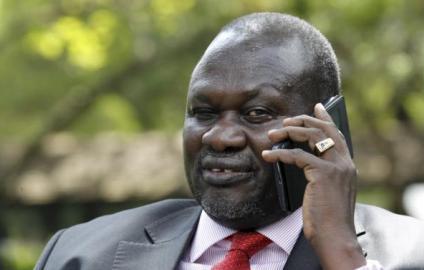South Sudanese rebel leader arrives in Juba, calls for unity
April 26, 2016 (JUBA) – South Sudan rebel leader and the first vice president-designate, Riek Machar has finally arrived in the capital, Juba in what is seen as a positive step in the formation of the country’s Transitional Government of National Unity (TGoNU).

“There are challenges that we need to overcome. First challenge is security. Second challenge is stabilizing the economy. Third, we have a lot of displaced people – internally and international. We need to reach out to such people,” Machar told reporters in Juba.
“We need to ensure humanitarian access is done so that humanitarian relief further to the rural areas or in the urban areas,” he added.
Machar lauded those who supported South Sudan’s peace process, specifically citing the Troika countries – the United States, Britain and Norway.
He said the government has been doing its part by hosting the advance team that arrived five months ago.
“With my arrival, we will push for the other obstacles and get rid of them and implement the peace agreement,” said Machar.
He added “Peace should spread out throughout the country”.
Akol Paul Khordit, who headed the Juba government delegation that received Machar remarked, “Today marks the watershed for peace in our country. His presence among us today in Juba signifies end of the war”.
Machar was later sworn in by the Chief Justice as the country’s first vice-president designate at State House in the presence of President Salva Kiir.
The South Sudanese rebel leader, who was the country’s vice president until July 2013, fled the country in December 2013 after a political dispute between him and President Kiir escalated into a civil war that took on ethnic dimensions. Following a peace agreement in August 2015, he was reinstated as frst vice president in February this year.
Despite a general lull in active combat since the signing of the peace deal, the ceasefire agreement has been repeatedly violated as fighting has flared up in areas less affected by the war.
Since the peace agreement was signed in August 2015, the United Nations estimates that over 100,000 people, mainly from South Sudan’s Western Equatoria and Western Bahr el Ghazal states, have fled into neighbouring countries, including the Democratic Republic of Congo (DRC) and East Darfur in North Sudan.
(ST)
